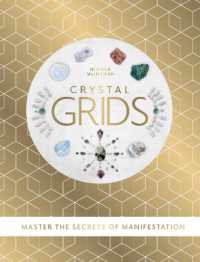Full Description
This book is a selection of studies presented at the 33rd International Conference of the International Computer Archive of Modern and Medieval English (ICAME), hosted by the University of Leuven (30 May - 3 June 2012). The strictly refereed and extensively revised contributions collected here represent recent advances in corpus linguistics, both in the development of specialist corpora and in ways of exploiting them for specific purposes. The first part focuses on "Corpus development and corpus interrogation" and features papers on the compilation of new, highly specialized corpora which aim to fill gaps in historical databases, and on new ways of extracting relevant patterns automatically from computerized datasets. The second part, devoted to "Specialist corpora", presents detailed descriptive studies on grammatical patterns in World Englishes, on neology, and - using a contrastive approach - on prepositions and cohesive conjunctions. The third and final part on "Second language acquisition" groups together studies situated at the intersection of corpus linguistics and educational linguistics and dealing with markers of relevance and lesser relevance in lectures, deceptive cognates, the automatic annotation of native and non-native uses of demonstrative this and that, and measuring learners' progress in speech and in writing. Each contribution in its own way reports on novel ways of getting mileage out of specialist corpora, and collectively the contributions attest to the rude health of computerized corpus linguistic studies.
Contents
Acknowledgements
Kristin Davidse, Caroline Gentens, Ditte Kimps and Lieven Vandelanotte: Introduction
Part 1. Corpus development and corpus interrogation
Anita Auer, Mikko Laitinen, Moragh Gordon and Tony Fairman: An electronic corpus of Letters of Artisans and the Labouring Poor (England, c. 1750-1835): compilation principles and coding conventions
Joan C. Beal and Ranjan Sen: Towards a corpus of eighteenth-century English phonology
Gregory Garretson and Henrik Kaatari: The computer as research assistant: a new approach to variable patterns in corpus data
Marco Schilk: Using currency annotated part of speech tag profiles for the study of linguistic variation - a data exploration of the International Corpus of English
Franck Zumstein: Are word-stress variants in lexicophonetic corpora exceptional cases or regular forms?
Part 2. Specialist corpora
Peter Collins, Xinyue Yao and Ariane Borlongan: Relative clauses in Philippine English: a diachronic perspective
Marco Schilk and Marc Hammel: The progressive in South Asian and Southeast Asian varieties of English - mapping areal homogeneity and heterogeneity
Antoinette Renouf: Neology: from word to register
Thomas Egan and Gudrun Rawoens: English amid(st) and among(st): a contrastive approach based on Norwegian and Swedish translation
Kerstin Kunz and Ekaterina Lapshinova-Koltunski: Cohesive conjunctions in English and German: systemic contrasts and textual differences
Part 3. Second language acquisition
Katrien L. B. Deroey: "Anyway, the point I'm making is": lexicogrammatical relevance
marking in lectures
M. Luisa Roca-Valera: Faux amis in speech and writing: a corpus-based study of English
false friends in the production of Spanish students
Thomas Gaillat, Pascale Sébillot and Nicolas Ballier: Automated classification of unexpected uses of this and that in a learner corpus of English
†Monique van der Haagen, Pieter de Haan and Rina de Vries: Crude contours: a pilot study into the feasibility of charting student speakers' proficiency
Pieter de Haan and †Monique van der Haagen: A longitudinal study of the syntactic development of very advanced Dutch EFL writing








